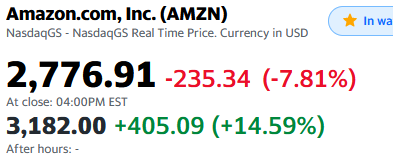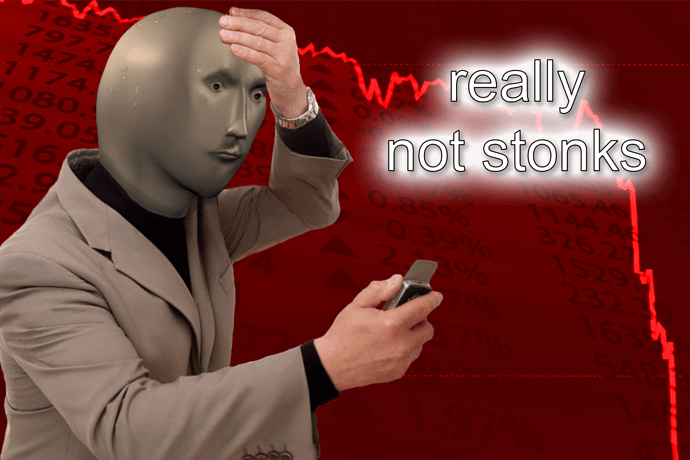I doubt it. Advisors cater to people that are intimidated by investing. Overconfident idiots that want to pick stocks don’t go looking for an advisor.
I’m pretty sure if you let underconfident regular folks manage their own money they’ll also tend toward betting heavily on whatever stock is trending. People legit have no clue what they’re doing and a relatively safe mutual fund will only fleece them a little bit.
You’d be surprised how many people just park their savings in GICs because they’re intimidated by anything else.
AMZN up 1/3 of a FB after earnings
*AMAZON 4Q EPS $27.75, EST. $3.77
That’s…odd.
SNAP down 23% today after FB bad earnings
currently up 38% AH after its own earnings
It’s because they marked their share in Rivian to market after the IPO, of course it’s down 42% since 12/31 and the change in the valuation of it made up 84% of their Q4 EPS.
Nah wall street analysts definitely just off. No incentive for cupcake estimates
So, assuming Amazon did not sell its stake in Rivian between 12/31 and now, they’ve lost 41% of that. And if they priced it at the IPO and not as of 12/31, they’re down 54%.
These earnings made up ~ $23 a share of value, although what I don’t know is what their initial investment in Rivian was. However, they’ve lost a sizable chunk of that since the IPO and since 12/31.
Their consensus estimate for next quarter is $9.45, and they could ALREADY have lost like $9 to $12 a share off Rivian. They could take a loss next quarter if they’re going to mark the Rivian holdings to market each quarter.
@spidercrab how does this usually work?
I’m assuming the market just cares about the adjusted EPS number so it doesn’t matter much.
Not clear what the “this” is, but here’s a quick response. I’m opening the first of what I expect will be 100 beers tonight, so I’m happy to expand on anything later.
- There is no question that Amazon will continue to mark their stake in Rivian to market, and that any changes in stock price will impact net income. It’s a GAAP requirement.** An incredibly stupid requirement, but a requirement still. (The effect on earnings will be net of tax, as they will be recording a deferred tax liability for any increases, and reducing the deferred tax liability for any decreases in stock price.)
**Technically they could change the way they account for it to an Equity Method Security, and each period record a proportionate share of Rivian’s net income (loss) as their own income (loss). But that seems unlikely if they’re not already accounting for it that way.
-
I would be stunned if any professional analyst cared about the non-operating impact of Rivian’s stock price on Amazon’s EPS. CNBC is reporting an adjusted earnings number of $5.80 per share that compares apples-to-apples with the estimated $3.57, which is consistent with analysts not giving a shit about the stupid effect of Rivian’s stock price.
-
The consensus estimate for next quarter’s estimate almost certainly doesn’t take into account non-operating income coming from changes in Rivian’s stock price. Even if Rivian craters and results in a GAAP Net Income loss, no one is going to give a shit, because the GAAP rule is stupid.
-
Rivian’s market value appears to be $53 billion, and I think Amazon owns around 17% of it. If Rivian goes to 0, the effect on Amazon’s market value will be $9 billion, or less than 1% of Amazon’s market value.
Overall, I think you are way fixating on current period’s EPS and placing far too much weight on Rivian. Rivian is close to meaningless in terms of valuing Amazon, other than being a small lottery ticket.
Thanks, I wasn’t sure how that worked and good analysis. I agree with most of it, I don’t think Rivian should have any significant impact on AMZN’s valuation.
Here’s what I disagree with:
I’ve seen estimates ranging from $4.50 to $6 per share excluding the Rivian valuation income. Estimates were $3.57, so they were trading at a multiple of 55 and beat by about $1 to $3 a share, so you’d expect a pop of $55 to $165 a share. They’re up $391 a share after hours. I think the huge topline EPS number is part of an emotional and inefficient response.
Likewise, if next quarter they announce losses of $3 a share due to a $13 Rivian loss, which means they actually slightly beat estimates and made $10 a share, I would expect it to go down significantly after hours.
We totally agree on this, I just don’t think the market is in agreement, and thus I think the market is making a mistake.
You have an interesting understanding of market efficiency if you think the market is making a ~$150 billion valuation mistake over adjusted vs. non-adjusted EPS in the press release.
Amazon is celebrating all its profit by jacking up the cost of Prime.
I don’t think the markets are efficient at all, for starters. I think a lot of people saw $27.75 and rushed to buy without reading a word of the release. The stock was up over 15% in like two minutes, which is a bit more than $200 billion in market cap. I am a fast reader and it took me 30 seconds in the release to get to the Rivian part, then you’d need some time to do the math to figure out the adjusted EPS (which their release doesn’t provide). It’s quite possible that algorithms were buying it based on the data input, which did not include the necessary info to correct.
But regardless, I think the valuation is/was/continues to be way too high anyway. The current after-hours P/E using adjusted earnings is between 70 and 80 depending. It is priced as if it’s going to be 3-5 times bigger when it’s done growing. It’s currently about 3% of the market cap of the entire United States, can it really get to 9% to 15%?
For perspective that’s currently as big as Amazon, Google, Facebook, and Salesforce combined on the low end. On the high end that’s as big as Amazon, Apple, and Facebook combined.
And remember that some of those companies are priced for huge growth, too. I think what’s going to happen is one by one, sooner or later, they’re mostly going to hit a bad earnings quarter or two, and the market is going to drag them down by 20% to 40% because they’re priced for near perfection… and when it does, the sector gets dragged down a couple percent too. They’ll make some of it back and we’ll repeat the process again at some point.
FB is 39% off ath, PYPL is 60% off ath, NFLX is 43% off. And they still have multiples of 17, 35 and 38 respectively.
A quick response, and then a longer one.
Quick response:
Amazon was down sharply today, presumably based on what the market thought that Facebook’s poor results implied about Amazon’s results. Then, when Amazon’s results turned out to be very positive, the market not only reversed its original Facebook-driven effect, but rewarded those positive results.
Net effect:

Amazon is up about $170 per share, which seems entirely consistent with what you think should have happened.
Longer response:
When I was in grad school, searching for a dissertation, I was convinced that there were endless examples of market anomalies. I was a huge Buffett fanboy even back then, and I was drawn to people like Robert Shiller (Irrational Exuberance) and Richard Thaler (Nudge). I was convinced that I would be able to write a great dissertation that documented a new anomaly. But it turned out that each mispricing that I thought was obvious didn’t actually exist in the data - when I applied careful statistical analysis, there was no evidence of mispricing to the various circumstances I looked at. I even got a proprietary dataset on CEO reputation, which is notoriously influenced by the firm’s recent stock price, but still no statistical evidence that it was related to mispricing.
So over time, I’ve come to the conclusion that obvious market mispricings are actually quite rare. I’ve even published a paper showing that what people thought was a market mispricing turns out to be a rational market response to relevant information.
I guess the point of me writing this is that I’m very sympathetic to the tendency to point at a particular market outcome and say “THE MARKET IS GETTING IT WRONG, WOW ARE THEY STUPID”. But I now believe the market gets it wrong far less often than I originally thought.
To be clear, I’m still confident that there are obvious mispricings. Like, Doordash is still an obvious short if I wasn’t so anchored on the fact that I covered it at like twice the price. Rivian is probably a zero, too.
But this Amazon thing that you’re looking at, in my opinion, is completely misguided. The market is absolutely not going to be misled by stupid mark-to-market EPS effects for a well-known company like Amazon.
Dude, c’mon—the increase is due to them having to buy “poop buckets” for all their drivers.
But regardless, I think the valuation is/was/continues to be way too high anyway. The current after-hours P/E using adjusted earnings is between 70 and 80 depending. It is priced as if it’s going to be 3-5 times bigger when it’s done growing. It’s currently about 3% of the market cap of the entire United States, can it really get to 9% to 15%?
This reads like gibberish to me. What on earth do you mean that it’s priced like it’s going to be “3-5 times bigger” when it’s done growing?
Why would you expect it to get to 9-15% of the market cap of the United States (whatever that means)?
The people who are moving billions around after AMZN’s earnings weren’t figuring out the Rivian stuff at 4 pm today by speed reading (like you).
More likely explanation: you don’t have an adequate understanding of the baseline expectations (built into the closing price) versus the actual results and how sensitive the valuation should be to that difference.
